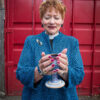 “It’s going to storm out,” she told him. “Want to carry Penny’s stone into the woods before we can’t?” Penny had been their first dog, a sweet-tempered golden retriever. She became very old and stiff, and her back arched with pain, yet she didn’t know how to die. On one of his visits Fraser had dug her grave, in case she died before the next one, and the dog had come with him into the woods and laid down beside the hole as it enlarged, enjoying the smell of fresh earth, the air of human activity. At one point he had measured her with the shovel handle, and she had wagged her tail amused. Still she wouldn’t die. The following weekend they called the vet to the place. Penny held up her foreleg and he injected a violet fluid. For a second or two she gazed upward for approval, then swooned to the lawn with an astonishing relaxation. As they watched in a ring (Kenny had stayed in the house, listening to records, refusing to watch), her breathing grew more and more shallow. Then she was dead in the November’s sun long shadows. When Fraser lifted the dog her skin had become a sack for her bones, as he laid her floppy body in the hole he had dug, it appeared to him through his absurd, excessive tears that he was burying a dozen golden summers, his children’s childhood and his own blameless prime.” Domestic Life in America – John Updike
“It’s going to storm out,” she told him. “Want to carry Penny’s stone into the woods before we can’t?” Penny had been their first dog, a sweet-tempered golden retriever. She became very old and stiff, and her back arched with pain, yet she didn’t know how to die. On one of his visits Fraser had dug her grave, in case she died before the next one, and the dog had come with him into the woods and laid down beside the hole as it enlarged, enjoying the smell of fresh earth, the air of human activity. At one point he had measured her with the shovel handle, and she had wagged her tail amused. Still she wouldn’t die. The following weekend they called the vet to the place. Penny held up her foreleg and he injected a violet fluid. For a second or two she gazed upward for approval, then swooned to the lawn with an astonishing relaxation. As they watched in a ring (Kenny had stayed in the house, listening to records, refusing to watch), her breathing grew more and more shallow. Then she was dead in the November’s sun long shadows. When Fraser lifted the dog her skin had become a sack for her bones, as he laid her floppy body in the hole he had dug, it appeared to him through his absurd, excessive tears that he was burying a dozen golden summers, his children’s childhood and his own blameless prime.” Domestic Life in America – John Updike
December 13, 1976, John Updike, published this paragraph in a story in the New Yorker titled “Domestic Life in America”. I have found it to be a lovely, lyrical and deeply sad story. It grapples with the pain of divorce in the context of a particular American family. The vignette that I have highlighted focuses on the death of a family pet.
People get divorced, they struggle with alienated adolescent children, they grieve the passing of loved ones and they mourn the loss of pets. I find it difficult reading Updike’s paragraph aloud without sobbing. I share the character’s “absurd excessive tears”.
Maybe it’s because I have a 13 year old dog who sleeps at my feet as I write this. I know his mortality clock is ticking loudly in the background of my life. I’ve taken to referring to him as a little old man, reminding myself of the brevity of his journey next to mine. We have journeyed together this past 13 years and his presence have been much larger than his compact terrier form.
I know some folks say they love dogs because they offer unconditional love. I don’t agree with that. I don’t think my dog loves me – I think he dogs me. He does what dogs do. They bond to us, they are willing to sleep in a heap with us on the floor, they depend on us, and sometimes they even protect us from evil and ourselves. But I don’t think they love us.
Why not love? To love something I believe you must understand that you can lose it, that it can be taken from you. The concept of loss, of losing someone or something is the condition for the possibility of love. The possibility of loss is the horizon line that adds the element of perspective to life. Without loss life would sail by, perhaps joyfully, but lacking the sweet and painful coloration added to the picture by loss. My dog Harry “dogs” me in his sweet way never knowing that one day we will, forever, be gone from each other.
I hope that you will not hold back those tears. Even when they may seem absurd and excessive. It is never too late to remember someone you loved with a tear. And if they are tears for a turtle or a dog, don’t fret. They are a testimony to a love that exists inside you. Sometimes brought on by something that appears small to someone else. Don’t hold back. Don’t allow anyone else to set the horizon line of life for you. Live in relation to yourself and you will find your own personal perspective of loss and love.
Rev. Fred — 5/8/2015





